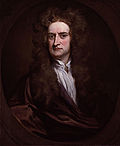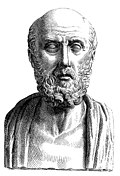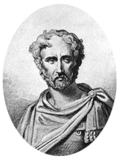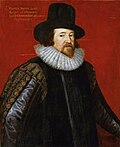Portal:History of science
The History of Science Portal
The history of science covers the development of science from ancient times to the present. It encompasses all three major branches of science: natural, social, and formal. Protoscience, early sciences, and natural philosophies such as alchemy and astrology that existed during the Bronze Age, Iron Age, classical antiquity and the Middle Ages, declined during the early modern period after the establishment of formal disciplines of science in the Age of Enlightenment.
The earliest roots of scientific thinking and practice can be traced to Ancient Egypt and Mesopotamia during the 3rd and 2nd millennia BCE. These civilizations' contributions to mathematics, astronomy, and medicine influenced later Greek natural philosophy of classical antiquity, wherein formal attempts were made to provide explanations of events in the physical world based on natural causes. After the fall of the Western Roman Empire, knowledge of Greek conceptions of the world deteriorated in Latin-speaking Western Europe during the early centuries (400 to 1000 CE) of the Middle Ages, but continued to thrive in the Greek-speaking Byzantine Empire. Aided by translations of Greek texts, the Hellenistic worldview was preserved and absorbed into the Arabic-speaking Muslim world during the Islamic Golden Age. The recovery and assimilation of Greek works and Islamic inquiries into Western Europe from the 10th to 13th century revived the learning of natural philosophy in the West. Traditions of early science were also developed in ancient India and separately in ancient China, the Chinese model having influenced Vietnam, Korea and Japan before Western exploration. Among the Pre-Columbian peoples of Mesoamerica, the Zapotec civilization established their first known traditions of astronomy and mathematics for producing calendars, followed by other civilizations such as the Maya.
Natural philosophy was transformed by the Scientific Revolution that transpired during the 16th and 17th centuries in Europe, as new ideas and discoveries departed from previous Greek conceptions and traditions. The New Science that emerged was more mechanistic in its worldview, more integrated with mathematics, and more reliable and open as its knowledge was based on a newly defined scientific method. More "revolutions" in subsequent centuries soon followed. The chemical revolution of the 18th century, for instance, introduced new quantitative methods and measurements for chemistry. In the 19th century, new perspectives regarding the conservation of energy, age of Earth, and evolution came into focus. And in the 20th century, new discoveries in genetics and physics laid the foundations for new sub disciplines such as molecular biology and particle physics. Moreover, industrial and military concerns as well as the increasing complexity of new research endeavors ushered in the era of "big science," particularly after World War II. (Full article...)
Selected article -

Electrochemistry is the branch of physical chemistry concerned with the relationship between electrical potential difference and identifiable chemical change. These reactions involve electrons moving via an electronically conducting phase (typically an external electric circuit, but not necessarily, as in electroless plating) between electrodes separated by an ionically conducting and electronically insulating electrolyte (or ionic species in a solution).
When a chemical reaction is driven by an electrical potential difference, as in electrolysis, or if a potential difference results from a chemical reaction as in an electric battery or fuel cell, it is called an electrochemical reaction. In electrochemical reactions, unlike in other chemical reactions, electrons are not transferred directly between atoms, ions, or molecules, but via the aforementioned electric circuit. This phenomenon is what distinguishes an electrochemical reaction from a conventional chemical reaction. (Full article...)
Selected image

This iconographic French tapestry from the early 16th century depicts the muse Astronomia consulting with an astronomer, possibly Ptolemy. The tapestry resides in the Röhsska Konstslöjdmuseet, but its origins are unknown.
Did you know
...that the word scientist was coined in 1833 by philosopher and historian of science William Whewell?
...that biogeography has its roots in investigations of the story of Noah's Ark?
...that the idea of the "Scientific Revolution" dates only to 1939, with the work of Alexandre Koyré?
Selected Biography -
Johann George Adam Forster, also known as Georg Forster (German: [ˈɡeːɔʁk ˈfɔʁstɐ]; 27 November 1754 – 10 January 1794), was a German geographer, naturalist, ethnologist, travel writer, journalist and revolutionary. At an early age, he accompanied his father, Johann Reinhold Forster, on several scientific expeditions, including James Cook's second voyage to the Pacific. His report of that journey, A Voyage Round the World, contributed significantly to the ethnology of the people of Polynesia and remains a respected work. As a result of the report, Forster, who was admitted to the Royal Society at the early age of twenty-two, came to be considered one of the founders of modern scientific travel literature.
After returning to continental Europe, Forster turned toward academia. He taught natural history at the Collegium Carolinum in the Ottoneum, Kassel (1778–84), and later at the Academy of Vilna (Vilnius University) (1784–87). In 1788, he became head librarian at the University of Mainz. Most of his scientific work during this time consisted of essays on botany and ethnology, but he also prefaced and translated many books about travel and exploration, including a German translation of Cook's diaries. (Full article...)
Selected anniversaries
- 1717 – Birth of Jean le Rond d'Alembert, French mathematician (d. 1793)
- 1802 – Death of André Michaux, French botanist (b. 1746)
- 1896 – Birth of Pavel Sergeevich Alexandrov, Russian mathematician (d. 1982)
- 1922 – Death of Max Abraham, German physicist (b. 1875)
- 1938 – LSD is first synthesized by Swiss chemist Dr. Albert Hofmann at the Sandoz Laboratories in Basel, Switzerland
- 1945 – Cold War: Operation Paperclip: The United States Army secretly admits 88 German scientists and engineers to help in the development of rocket technology
- 1974 – Death of Walther Meissner, German technical physicist (b. 1882)
- 1999 – Death of Daniel Nathans, American microbiologist, recipient of the Nobel Prize in Physiology or Medicine (b. 1928)
- 2005 – Death of Henry Taube, Canadian-born chemist, Nobel Prize laureate (b. 1915)
Related portals
Topics
General images
Subcategories
Things you can do
Help out by participating in the History of Science Wikiproject (which also coordinates the histories of medicine, technology and philosophy of science) or join the discussion.
Associated Wikimedia
The following Wikimedia Foundation sister projects provide more on this subject:
-
Commons
Free media repository -
Wikibooks
Free textbooks and manuals -
Wikidata
Free knowledge base -
Wikinews
Free-content news -
Wikiquote
Collection of quotations -
Wikisource
Free-content library -
Wikiversity
Free learning tools -
Wiktionary
Dictionary and thesaurus






























































